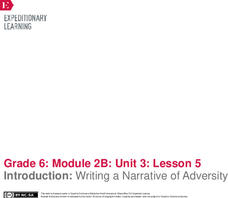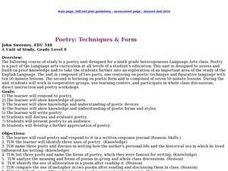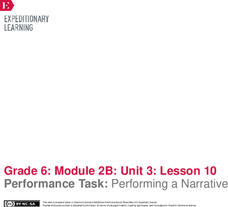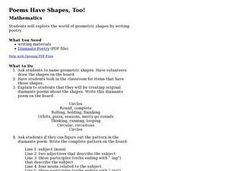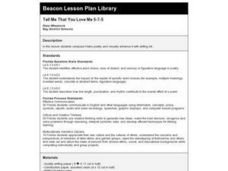Teachnology
Shape (Or Concrete) Poems
Poetry comes in all shapes and sizes. Young writers pick a shape, select words and phrases that describe how the shape makes them feel, and create a shape poem. A raindrop example and step-by-step instructions give your budding poets a...
EngageNY
Writing the Final Narrative: Monologue or Concrete Poem
Get inspired to help those creative juices flow. Using the resource, scholars write their final, best version of their narrative monologues or concrete poems. Next, they prepare for a performance task by watching and discussing a video...
Texas Education Agency (TEA)
How to Read and Analyze a Poem (English III Reading)
A poem is compressed speech, like a can of frozen juice with all the water pressed out. An interactive teaches users how to reconstitute the language, the structure, and the literary devices to appreciate all the subtleties the poet...
EngageNY
Analyzing, Comparing, Sharing: Modern Voices
What do modern voices sound like? Scholars explore the topic, reading two concrete poems from John Grandit's Blue Lipstick and analyzing them using a graphic organizer. Next, they read a third poem and work with partners to look for...
Curated OER
Poetry Writing Unit: Writing a Film Poem
Film poems? To concluded a poetry unit, writers select one of their own poems and create a film that brings to life the sounds and images of their work. Included with the detailed unit plan are daily lessons, student examples, a list of...
Curated OER
Everyone Can Write Poetry
Embark on a journey of writing several different types of poetry. Fifth graders read several examples, and use the examples to model their own writing. Each poem is to be accompanied by a different art visual representation. In the end,...
EngageNY
Introduction: Writing a Narrative of Adversity
A little adversity is good for writing. Scholars review narrative-based monologues and concrete poems and choose which genre to use to express their own theme of adversity. Pupils also consider how to structure their narratives by...
Curated OER
Poetry: Techniques & Form
Ninth graders explore poetic technique and figurative language in this ten lesson unit. Comparisons are made between a variety of forms of poetic expressions and the lives of several poets are studied.
Curated OER
Poetry Prodigies
Students in three classes in different locations become Poetry Prodigies as they use iChat AV and an iSight camera to teach and explore from each other about different poetic styles. They explore six types of poetry are taught:...
Curated OER
Unleash the Power of Poetry in Your Classroom
Students can gain an appreciation of poetry by being encouraged to express their opinions and ideas.
Curated OER
Understanding Immigration Through the Use of Triante Poetry
Third graders read a book about emigrating to America. They create and illustrate a triante poem using sensory words, depicting something they liked about the story.
Syracuse City School District
Literary Elements
Address the literary elements in a piece of writing using these materials. The packet includes plenty of resources, and focuses mainly on theme, character, and point of view, with some materials for setting, symbolism, and author's...
EngageNY
Performance Task: Performing a Narrative
Calling all performers! Scholars present a modern-day theme of adversity by performing their narratives for the class. As individuals watch their peers, they take notes on each performance using an Audience Note Sheet.
Curated OER
Poetry
Fifth graders read several poems by famous poets and identify what about their style makes them unique. They then analyze and compare poetic style, use of forms and themes. Next, 5th graders investigate and collect different examples of...
Curated OER
Monster: Compare and Contrast
Helpful for a unit on Walter Dean Myers' Monster, or any novel that you are teaching, a graphic organizer prompts learners to compare and contrast different character traits. The first box has one set of lines to jot down what two...
Curated OER
Poems Have Shapes, Too!
Students explore the world of geometric shapes by writing poetry. They use the Diamante Poetry worksheet. They select one geometric shape and, using the template, create their own poem.
Curated OER
Valerie Bloom Poetry
Students listen to Granny Is, a poem by Valerie Bloom and discuss the metaphors in the poem. In this poetry lesson, students read poetry written by Valerie Bloom and discuss the techniques she uses. Students write grandmother poems.
Curated OER
Show Don't Tell
Students review the Show Don't Tell method of writing haiku poetry. They practice distinguishing poetic language from academic language and create poems based on images, not explanations.
Curated OER
"The Wind" by James Reeves
Inntroduce primary learners to essential critical reading strategies with an activity based on James Reeves' poem, "The Wind." Learners listen as the poem is read, first as a riddle, and then re-read with the title visible. The class...
Curated OER
Poetry Book
Students study the following terms and concepts: word choice, dialect, invented words, concrete terms, abstract terms, figurative and sensory language. In cooperative groups, they select three of the terms, research them, and pick poems...
Curated OER
Poetry for Kids
Sixth graders be immersed indirect experiences which are opportunities for students to reflect, look back, debrief or abstract from their experiences what they have felt, and thought, and studied.
Curated OER
Tell Me That You Love Me 5-7-5
Students listen to several examples of Haiku poetry and discuss the strict format. Then students create and edit their own Haiku poems and enhance them with ink designs.
EngageNY
Making a Claim: Moon Shadow’s Point of View of the Immediate Aftermath
Body paragraphs are the building blocks of every essay. Pupils view and discuss a model essay using a rubric to evaluate one of its supporting paragraphs. Next, scholars use what they've learned to continue drafting their own literary...
Curated OER
Our Environment
Students examine the world's environmental dilemmas and create project depicting how to improve the environment. They study ten endangered species.








